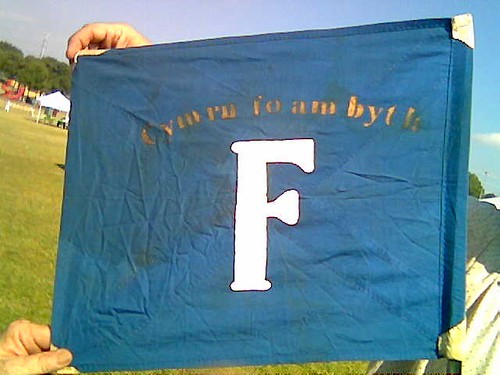I’d long known and taught about the Irish and Scottish who filled the ranks of the Confederate Army. This weekend at the Bedford, Texas Celtic Heritage Festival, I learned about the Welsh who served the South. Jefferson Davis was of Welsh ancestry, as was Catesby ap Roger Jones surgeon and commander of the Confederate Iron Clad C.S.S. Virginia. (“ap” means son of in Welsh). This site has some other good information on their role in the Civil War, including a photo of a grave in Wales listing the name of a Welsh soldier who fought and died for the Confederacy. According to this site, there are over 10,000 pages written in America (in the Welsh language) that were composed during the Civil War. There are also countless diaries, poems, letters and other unpublished materials. I predict that this will be a gold mine of information. Efforts are being made to translate it.
I met some Civil War reenactors of the 9th Texas Infantry–one of the best living history units I know of. You should visit their site. They are knowledgeable and portray a variety of units, including Zouaves. Here is a flag of the 9th Texas, Company, F. (originally from the Paris, Texas area) that the 9th Texas had on display. Note the Welsh inscription. So there were some Welsh Confederate units. As I am of Welsh ancestry (as well as Ulster-Scots) this pleased me greatly. If my research is correct, the writing means “Wales Forever.” I intend to have this flag made to add to my Civil War flag collection.


Thanks for this information. I have been aware of the presences of the Scots and Irish & Scotch-Irish as participants in the War Between the States. I did not have any information on the Welsh. The workshop I have been conducting for several years in Jackson and now finally in DFW area at CHF and North Texas Irish Festival has focused on “Tracing Celtic Music in America”. In addition to the Revolutionary War period, the Civil War was a period rife with tunes from British Isles, especially Ireland and Scotland, which were known as in they were those countries, but also tunes set to different lyrics or parodied. I have been told that “Annie Laurie” was a favorite song of soldiers during the Civil War. Church music has borrowed from Irish, Scottish and Welsh folk tunes to which new lyrics have been written as hymns for worship. Examples can be found in many denominations’ hymn books.
I am from Wales and can also speak welsh and yes “Cymru fo am byth” does actually mean wales forever. And also in a strange way some welsh say “fe godwm ni eto” which translates as we will rise again when talking about welsh independence